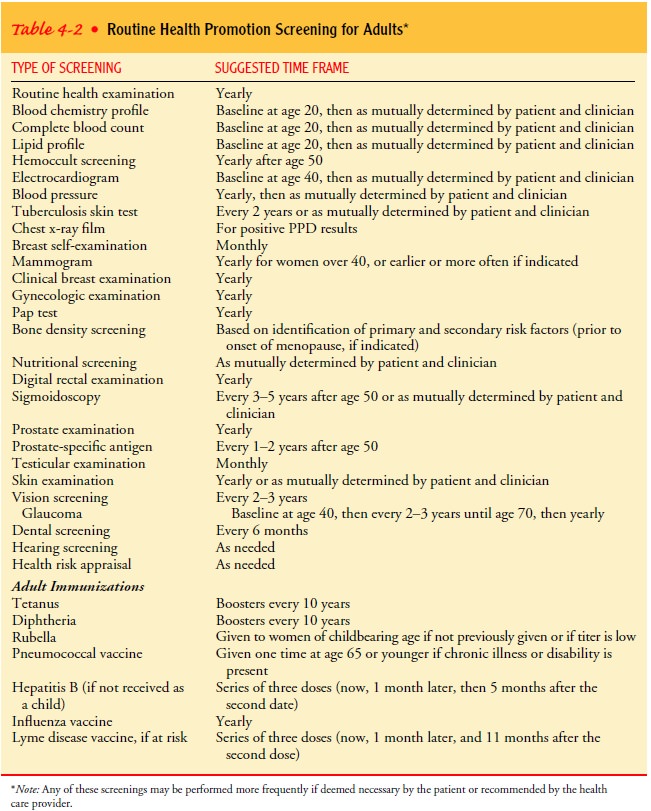Chapter: Medical Surgical Nursing: Health Education and Health Promotion
Health Promotion Throughout the Life Span
Health Promotion Throughout the Life Span
Health promotion is a
concept and a process that extends through-out the life span. Studies have
shown that the health of a child can be affected either positively or
negatively by the health practices of the mother during the prenatal period.
Therefore, health pro-motion starts before birth and extends through childhood,
adult-hood, and old age.
Health promotion includes health screening. The American Academy of Family Physicians has developed recommenda-tions for periodic health examinations that identify the age groups for which specific screening interventions are appro-priate. Table 4-2 presents the general population guidelines; specific population standards and guidelines have also been recommended.

CHILDREN AND ADOLESCENTS
Health screening has
traditionally been an important aspect of childhood health care. The goal has
been to detect health prob-lems at an early age so that they can be treated
early in a child’s life. Today, health promotion goes beyond the mere screening
of children for disabilities and includes extensive efforts to pro-mote positive
health practices at a very young age. Because health habits and practices are
formed early in life, children should be encouraged to develop positive health
attitudes. For this reason, more and more programs are being offered to
school-age children and to adolescents to help them develop good health habits.
Although the negative results of practices such as smoking, risky sexual
activities, alcohol and drug abuse, and poor nutrition are explained in these
educational programs, emphasis is also placed on values training, self-esteem,
and healthy lifestyle practices. The projects are designed to appeal to a
particular age group, with emphasis on learning experiences that are fun,
interesting, and relevant.
YOUNG AND MIDDLE-AGED ADULTS
Young and middle-aged
adults represent an age group that not only expresses an interest in health and
health promotion but also responds enthusiastically to suggestions that show
how lifestyle practices can improve health. Adults are frequently motivated to
change their lifestyles in ways that are believed to enhance their health and
wellness. Many adults who wish to improve their health turn to health-promotion
programs to help them make the desired changes in their lifestyles. They
respond in overwhelming numbers to programs that focus on topics such as
general well-ness, smoking cessation, exercise, physical conditioning, weight
control, conflict resolution, and stress management. Because of the nationwide
emphasis on health during the reproductive years, young adults actively seek
programs that address prenatal health, parenting, family planning, and women’s
health issues.
Programs that provide
health screening, such as those that screen for cancer, high cholesterol,
hypertension, diabetes, and hearing impairments, are quite popular with this
age group. Pro-grams that cover health promotion for people with specific
chronic illnesses such as cancer, diabetes, heart disease, and pul-monary
disease are also popular. It is becoming more evident that chronic disease and
disability do not preclude health and well-ness; rather, positive health
attitudes and practices can promote optimal health for people who must live
with the limitations im-posed by their chronic illnesses and disabilities.
Health-promotion
programs can be offered almost anywhere in the community. Common sites include
local clinics, elemen-tary schools, high schools, community colleges,
recreation cen-ters, churches, and even private homes. Health fairs are
frequently held in civic centers and shopping malls. The outreach idea for
health-promotion programs has served to meet the needs of many adults who
otherwise would not avail themselves of opportuni-ties to strive toward a
healthier lifestyle.
The workplace has become
a center for health-promotion activ-ity as employers become increasingly
concerned about the rising costs of health care insurance to treat illnesses
that are related to lifestyle behaviors. They are also concerned about
increased absen-teeism and lost productivity. For these reasons, many businesses
have instituted health-promotion programs in the workplace. Some employ
health-promotion specialists to develop and implement the program, and others
purchase packaged programs that have already been developed by health care
agencies or private health-promotion corporations.
Programs offered at the
workplace usually include employee health screening and counseling, physical
fitness, nutritional awareness, work safety, and stress management and stress
reduc-tion. In addition, efforts are made to promote a safe and healthy work
environment. Many large businesses provide exercise facil-ities for their
employees and offer their health-promotion programs to retirees. If employers
can show cost-containment benefits from such programs, their dollars will be
considered well spent, and more businesses will provide health-promotion
programs as a ben-efit of employment.
ELDERLY ADULTS
Health promotion is as important for the elderly as it is for other age groups. Despite the fact that 80% of people older than 65 years of age have one or more chronic illnesses and about 50% are limited in their activity, the elderly as a group experience significant gains from health promotion. Clinical work indicates that the elderly are very health-conscious and that most view their health positively and are willing to adopt practices that will im-prove their health and well-being (Ebersole & Hess, 1997; Staab
Hodges, 1996). Although
their chronic illnesses and disabili-ties cannot be eliminated, these adults
can benefit from activities that help them maintain independence and achieve an
optimal level of health.
Various health-promotion
programs have been developed to meet the needs of older Americans, many of
which began within the Department of Health and Human Services. Both public and
private organizations continue to be responsive to health promo-tion, and more
programs that serve the elderly are emerging. Many of these programs are
offered by health care agencies, churches, community centers, senior citizen
residences, and a variety of other organizations. The activities directed
toward health promotion for the elderly are the same as those for other age
groups: physical fit-ness and exercise, nutrition, safety, and stress
management.
Related Topics